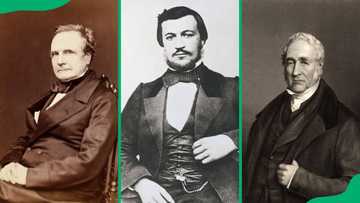Global site navigation
- Celebrity biographies
- Quotes - messages - wishes
- Bizarre facts
- Celebrities
- Family and Relationships
- Women Empowerment
- South Africa
- Cars and Tech

Who invented homework and why? Facts you should know
In today's world, homework is a common practice in education systems worldwide to reinforce learning outside the classroom. But have you ever wondered who invented homework and why?


TABLE OF CONTENTS
Homework history/origin of homework, pliny the younger (61—112 ce), johann gottlieb fichte (1762—1814), horace mann (1796—1859), why was homework made, when was homework invented, was homework invented as a punishment, what is the purpose of homework, who was the first person to do homework, why does homework exist, frequently asked questions.
Everyone who has been a student of any venture is familiar with take-home work as a familiar foe. Students have spent late nights poring over textbooks, struggling to finish assignments, and wondering who conjured up this tedious task. Due to its widespread use, many theories and myths surround its creation, sparking curiosity about its origin.
The history of take-home work dates back to ancient civilisations , where writing exercises reinforced learning. In ancient Egypt, students practised hieroglyphic writing, while in Greece, philosophers like Plato and Aristotle advocated for written exercises to enhance knowledge and skills.
The Romans also assigned take-home work, focusing on math and literature. These early forms of take-home work laid the foundation for modern practices.

Top 15 famous engineers of all time ranked: Who reshaped the world?
Who invented homework and why?
Its origin cannot be attributed to a single inventor. Though Italian teacher Roberto Nevilis is credited with inventing take-home work in 1905, this claim needs more solid historical evidence.
Homework practices can be traced to ancient civilisations such as Greece, Rome, and Egypt. Other names associated with the development of take home work include the following:
Pliny was an oratory teacher in ancient Rome. He assigned practice tasks to students to improve their public speaking skills.
He was an 18th-century German philosopher who helped develop the Volksschulen (People's Schools). He also made take-home work mandatory, believing it was essential for creating a unified Germany.

Did Horace Mann invent homework? Horace Mann did not invent homework . He was a 19th-century American educator and politician who introduced it to the American education system after being influenced by Germany's compulsory schooling.

15 top survival books with the best techniques for nature and wilderness
The concept of homework predates Mann, with roots in ancient civilisations such as Rome, Greece, and Egypt. Mann's advocacy helped make take-home work a common practice in U.S. schools.
Homework reinforces learning, supplements classroom instruction, and develops essential skills such as time management and self-discipline. In ancient Rome, Pliny the Elder advocated for assignments to solidify knowledge.
During the Industrial Revolution, take-home work prepared students for the workforce. Later, educators like John Dewey emphasised critical thinking and problem-solving, making take-home work a consistent tool for extending learning beyond the classroom.
Its exact date is unknown but dates back to ancient Rome, where Pliny the Younger assigned tasks to students. The modern concept of take-home work evolved, and 19th-century educators like Johann Gottlieb Fichte in Germany and Horace Mann in the United States significantly influenced it.

14 famous philosophers and their principles and influence on the world
The idea behind take home work was not for punishment. The myth that Italian teacher Roberto Nevilis invented take-home work in 1905 (or 1095) to punish students is false. In 1905, the Roman Empire was focused on the First Crusade, and formal education did not exist.

California reportedly banned homework for children under 15 in 1901, making it impossible for Nevilis to have invented take home work in 1905.
It helps reinforce learning, develop study habits, and prepare students for independent work. It also helps teachers determine understanding, teaches problem-solving, and keeps parents informed about classroom learning.
The identity of the first person to do homework is unknown, as homework has evolved over centuries. However, Johann Heinrich Pestalozzi, a Swiss educator in the late 18th and early 19th centuries, was an early advocate of homework.

25 famous people who changed the world and impacted history
Pestalozzi emphasised home-based assignments to reinforce classroom learning, marking an early formal use of take-home work in education.
Homework exists primarily to reinforce and extend learning that takes place in the classroom. It serves several purposes, including the following:
- Practice: Homework allows students to practice what they have learned in class, reinforcing concepts and helping them develop skills.
- Preparation: It prepares students for upcoming lessons, enabling them to come to class ready to engage with new material.
- Independent learning: Take-home work encourages students to work independently, promoting self-discipline, time management, and responsibility.
- Extension: It extends learning beyond the classroom, allowing students to delve deeper into topics and apply knowledge in different contexts.

As take-home work remains an integral part of modern education, students may grumble about it but cannot deny its value. Here are some questions about its origins and the best answers:

Top 20 best high schools in Tanzania ranked: All you need to know
- Why did homework get banned? Take-home work was banned in California in 1901 for students under 15 due to concerns that it jeopardised children's mental and physical health.
- How did the person who invented homework die? According to the myth about the supposed inventor, he is said to have died either in an accident or some gruesome people murdered him.
- What is the concept of homework? It consists of tasks teachers give students to complete outside the classroom.
- Who invented homework in the United States? Educational reformer Horace Mann primarily formalised homework in the late 19th century to reinforce classroom learning and study habits.
The question of who invented homework remains debated, with theories ranging from ancient civilisations to modern educators. Despite the uncertainty, homework has played a significant role in shaping education and is a fundamental aspect of learning.
READ ALSO: Top distance learning colleges in South Africa

What is the highest IQ ever recorded: Top 35 smartest people of all time
As published on Briefly , enrolling in accredited distance learning colleges in South Africa is an excellent way to advance your education. Work, family, and other responsibilities should not hinder anyone from progressing academically.
Distance learning in South Africa is a convenient study method, especially for adults. Many colleges and students find this mode of learning cost-efficient. Accredited distance learning colleges in South Africa offer numerous diploma and certificate programs.
Source: Briefly News
Favour Adeaga (Lifestyle writer) Dr. Favour Adeaga is an author, speaker, and coach. He graduated with a degree in Mass Communication from The Polytechnic, Ibadan, Nigeria. He did his internship at The Nation Newspaper and taught diploma students in Newspaper and Magazine courses at the Nasarawa State University, Keffi. He has curated the facts and life hacks category since 2018. Dr Favour is the author of several books available on Amazon. He currently lives in Nigeria. Email: [email protected]

IMAGES